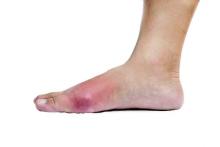SAN FRANCISCO – Patients with gout who fail to sufficiently lower their serum urate level despite adherence to a regimen of allopurinol 300 mg/day may have a genetic polymorphism affecting their response to the medication, according to new findings presented at the annual meeting of the American College of Rheumatology.
“ABCG2 genotyping may identify patients who will not reach target serum urate levels on standard allopurinol doses,” said study presenter and principal investigator Dr. Lisa K. Stamp of the University of Otago, Christchurch, New Zealand.
Sustained lowering of serum urate (SU) to less than 6 mg/dL – achieved most commonly by inhibition of xanthine oxidase using allopurinol – is crucial for the long-term management of gout. Yet, in clinical practice, less than half of patients treated with allopurinol achieve this SU target. This is usually because of poor adherence or an inappropriately low dose of the drug. But, in some patients, the response can be poor even despite allopurinol 300 mg daily. The reason for failure of allopurinol treatment in these poor responders has been unknown.
“It is important to consider genes that might help predict response or toxicity. To date, pharmacogenetic studies of allopurinol have focused on adverse effects. However, we were more interested in predicting response. The ability to predict poor response is important because it can influence drug choice and shorten the time to achieve target SU,” Dr. Stamp said.
The present study helps to validate the results of a previous genomewide association study in which the single nucleotide polymorphism (SNP) rs2231142 in ABCG2 was associated with poor response to allopurinol (Clin Pharmacol Ther. 2015 May;97[5]:518-25). Adherence to allopurinol was not examined in that study, so Dr. Stamp and her colleagues set out to make sure that it was not a confounder. The current study examined the SNP’s association with allopurinol response more closely in 264 gout patients who were well characterized phenotypically. All were being treated with allopurinol and all adhered to their treatment regimen. Overall, 120 were deemed good responders, with SU of 6 mg/dL or less on daily allopurinol of 300 mg or less, and 68 were poor responders, with SU of 6 mg/dL or higher despite a daily dose of allopurinol exceeding 300 mg. Another 76 patients were nonadherent/nonclassifiable. The poor responders tended to be younger and were more likely to be male, nonwhite, and heavier than their counterparts who responded well.
Genotyping for the rs2231142 SNP revealed a greater preponderance of the minor genotype in poor responders, compared with good responders (39% vs. 18%). This genotype was significantly associated with poor response after adjusting for age, sex, body-mass index, and ethnicity (odds ratio, 2.91; 95% confidence interval, 1.71-5.17; P = .00015). The mechanism – still to be proven – may involve reduced urate excretion from the gut.
There may not be a case for screening for the genotype just yet, according to Dr. Christopher M. Burns, a rheumatologist at Dartmouth Hitchcock Medical Center, Lebanon, N.H., who was not involved in the study. He said “it’s hard to see why you would screen for this variant, as it doesn’t account for all resistance, and you would still end up pushing the allopurinol dose up to achieve a SU of less than 6.0 mg/dL anyway. Since it’s not an adverse event warning signal, but simply one marker of possibly requiring a higher allopurinol dose, and allopurinol is an inexpensive drug, why would you check it? At least, that’s my sense. The findings may be more important simply for a better understanding of urate metabolism and the mechanism of action of allopurinol and oxypurinol.”
Dr. Stamp reported a financial disclosure with AstraZeneca.

